May mountain flowers and the Noon Gun
by Diana
Studer
- gardening for biodiversity
in Cape Town, South Africa
Hiking among wildflowers
in the mountains
around Cape Town
Nine ericas from five hikes. The genus Erica includes [about] 770 species in the
Western and Eastern Cape. The largest genus of the Cape Floral Kingdom.
On Elsie's Peak dangly Erica
coccinea. Pink bells Erica viscaria. One
sided Erica nudiflora. White Erica ericoides?
Grey fronds Syncarpha
gnaphaloides. White Olea capensis. Cottonwool
Tarchonanthus littoralis. Macrostylis
villosa long styles.
No ID grass. Spiral of Oedera
imbricata leaves. Leucadendron
xanthoconus cone. Brunia noduliflora silver
filigree buttons.
Yellow Euryops
abrotanifolius. Yellow stars Gnidia
juniperifolia. Pink and yellow sparkly stars Struthiola ciliata. Burgundy feathering Pelargonium myrrifolium.
At Redhill Othonna
quinquedentata is growing on me. The flowers dance in a yellow haze above
their neighbours (as Gaura does). The
five toothed leaves make it gardenworthy out of flower too.
Again Redhill. Pink on white stars Trichocephalus stipularis. Understated euphorbia Clutia alaternoides. Anaxeton laeve pink
bud 'strawberries" - and white flowers, a tiniest bunch of roses - bare
stalks where Metalasia has leaves.
Eroded rock exposed by the empty Silvermine dam. Yellows. Osteospermum polygaloides. Russet bud Ursinia tenuifolia. Prickly Cullumia setosa.
Salt and pepper Erica
imbricata. Dangly Erica plunkenetii. Pink
cupped in burgundy Erica glabella. Little
Lachenalia rubida.
Oxalis luteola yellow flower - bud and leaves. Oxalis punctata in pink - and white.
On Devil's Peak the Ungardener 'stands' on Table Mountain above
Cape Town.
At Spitskop bunny ears grass. Yellow Senecio burchellii. Blue cup Roella
ciliata.
Oxalis eckloniana with
a long tube in puce.
Sky blue Salvia
chamelaeagnea. Lime gold Leucadendron
salignum.
Nectar thieves were at
Erica mammosa. Pink and silver Indigofera
cytisoides.
Eroded I see You rock. Creamy Phylica buxifolia. White fireworks Staavia radiata
Pelargonium
myrrifolium.
Spider on her web. Black bearded Protea lepidocarpodendron. Wild
Protea cynaroides. Protea repens in pink.
Along Silvermine River mauve Oftia africana flowers - toothed leaves. Yellow Microdon dubius and Bulbine praemorsa.
Purple and white Metalasia
divergens. Milkweed architecture Gomphocarpus
cancellatus. Silvermine in drizzle. White Maytenus oleiodes.
Lobelia pinifolia (caught
in focus at last!) White feathers Searsia
tomentosa.
Protea repens in
white. Australian tea tree invading
Silvermine!
Helichrysum cymosum growing along the river. A bit disconcerted to
see the 'groundcover'
I planted under the lemon tree, is less mat and more shrublet. Silver
leaves and knots of golden flowers.
Despite being a born and bred Capetonian, I have never got
used to the Noon Gun. I never
worked in the City. I wonder how many tourists are startled in the midst of a
busy day, to hear a cannon fired and see a cloud of smoke above Signal Hill.
The Gun is the Signal. His hikers had to sprint to get there in time to be
blown away!
From Redhill towards Scarborough Erica ericoides gone gloriously to baked terracotta seeds - across
the valley and up the slope, not as I first thought burnt reminders of the
previous fire. Against lime Leucadendron
laureolum. First Mimetes fimbrifolius.
Asparagus capensis for
bees. Scarlet Gladiolus merianellus bonaspei (=
Good Hope). Agathosma lanceolata flowers
- seeds.
Silver and mauve Podalyria
sericea. Mauve button Othonna
digitata. Dark tipped Erica corifolia.
Groundcover Euphorbia tuberosa.
We both saw Gladiolus
maculata. He as he climbed up Wolfkop to the Fat Lady Shelter. Next day our
fynbos ramble found each plant was a slightly different colour - chocolate,
peach, lemon or raspberry!
I invite you to join us at Elephant's Eye on False Bay.
Please subscribe as you prefer
via Feedly,
or Bloglovin,
Teal blue text is my links.
To read comments if you are in email or a Reader,
first click
thru to the blog)
Thanks for comments that add value. Maybe start a new thread
of discussion? BTW your comment won't appear until I've read it. No Google
account? Just use Anonymous, but do leave a link to your own blog. I would
return the visit, if I could...
I welcome comments on posts from the last 2 months.



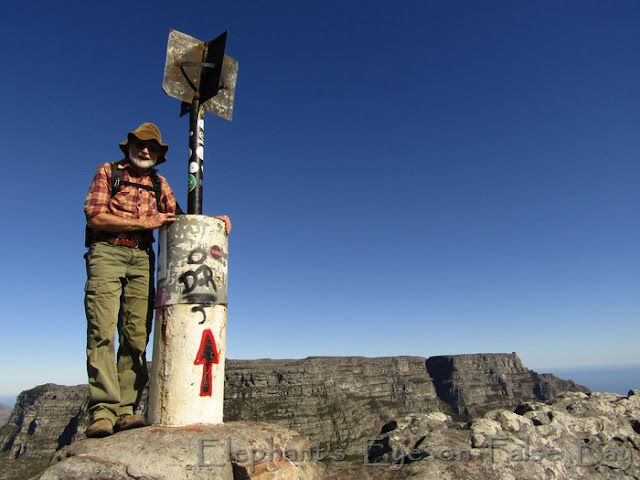
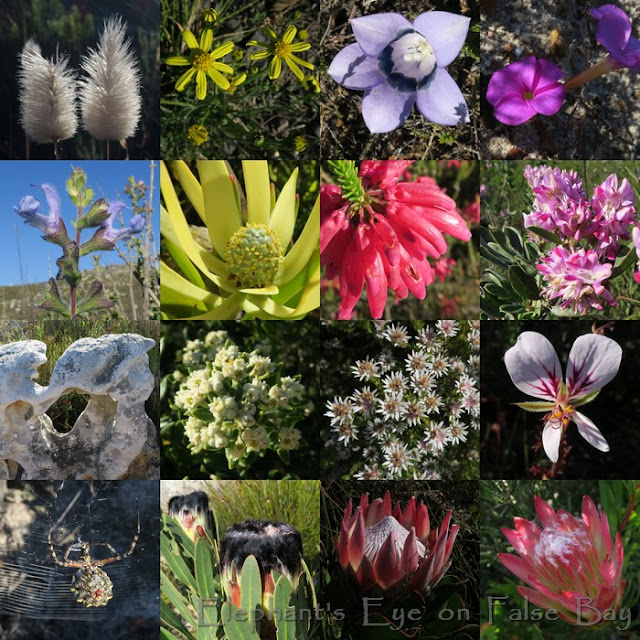
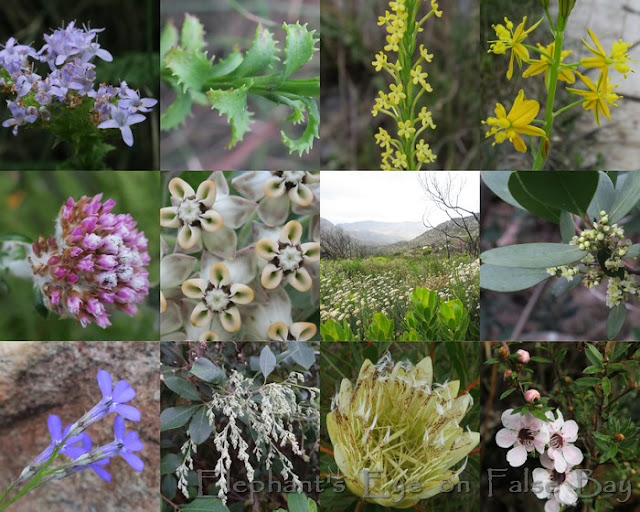

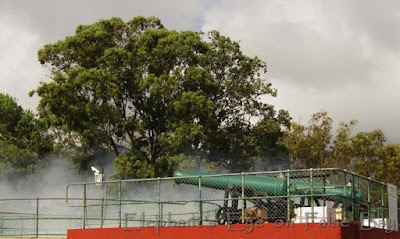

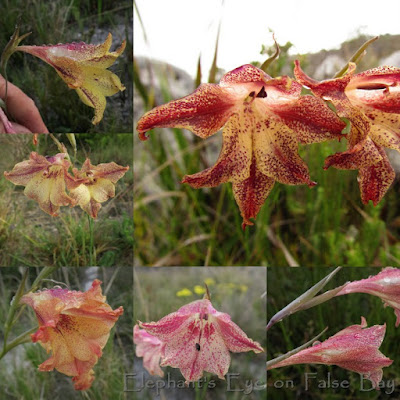

The photos from your hikes never disappoint. I've never tried to grow Erica here but perhaps I should.
ReplyDeleteI confess I battle to grow ericas. Each one need particular conditions - but Hoover Boo is successful!
DeleteGladiolus maculata is very interesting; I don't remember seeing it before. Do you think the colour differences are due to conditions or just natural variety?
ReplyDeleteThe natural variation from which horticulture can source 'new varieties'. Even those growing near each other varied.
DeleteThe sheer number of gorgeous plants native to your country continues to astound me. I will come back to this post again and again, to admire and be amazed. Brunia noduliflora! OMG!!
ReplyDeleteMy own little SA Erica is growing well--I'm excited that it might survive here--if it can get through the summer.
Birds and their flowers we have in common.
DeleteStunning flowers and a strange tradition :-)
ReplyDeleteAn amazing array of blooms, Diana. I miss the ericas from my native land where heathers and heaths were part of my childhood, growing freely on the surrounding hills. Here I've had no luck with them. P. x
ReplyDeleteAstonishing number of wildflowers, never seen anything like it. The Noon Gun does sound rather startling.
ReplyDeleteIt always takes me forever to read your posts because all of the blooms are new to me and very enjoyable.
ReplyDeleteAs for the noon gun - what a great tradition! I am sure everyone checks their watches to make sure they are running correctly.
Jeannie @ GetMeToTheCountry
What an usual tradition. And what lovely blooms!
ReplyDeleteAmalia
xo
Well wow, wow again, always you make me say Wow! xxx
ReplyDeleteBeautiful! So many flowers! I do love those gladiolus, too. Erica don't grow well here. It's too warm and humid. It's always inspiring to see plants growing in such difficult areas.
ReplyDeleteYour images are always so good looking, picture perfect .
ReplyDelete